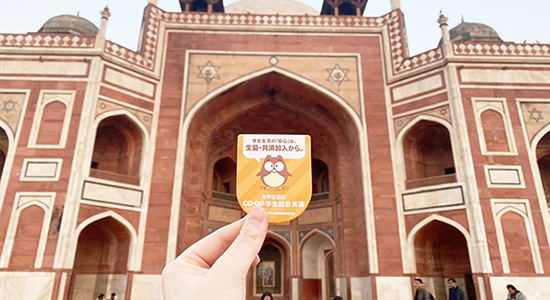International Activities
Attending ICEI Statutory Meeting and Knowledge Exchanges at Three Prominent Indian Universities
TABLE OF CONTENTS
Overview of This Trip
1. Purpose
Participation in the Statutory Meeting of ICA Asia-Pacific Committee on Co-operatives in Educational Institutions (ICEI)
- Participation in the related international exchange program at Shri Ram College of Commerce (SRCC), sponsored by ICEI and National Cooperative Union of India (NCUI)
Visiting Chanakya University to give a presentation on Japanese university co-operatives
2. Itinerary
- December 20: Arrive in India (Delhi) via Hong Kong.
- December 21: Attend the ICEI Statutory Meeting (NCUI Office).
- December 22: Participate in the international exchange seminar at SRCC, then travel to Bangalore.
- December 23: Visit Chanakya University to tour the planned new campus site, give a presentation on Japanese University Co-op, and exchange ideas with local university students.
- December 24: Visit Nitte Meenakshi Institute of Technology to exchange opinions and visit the co-op. Also, visit the home of Vice Chancellor Prof. Yashavantha Dongre of Chanakya University.
- December 25: Depart from India and return to Japan via Malaysia.
ICEI Statutory Meeting (December 21)
About ICEI
- ICEI originated in 1993 as a subcommittee of the ICA-AP Consumer Co-operative Committee, advocating for campus cooperatives to improve campus life. In 2008, ICEI became an independent organization at the ICA-AP Regional Assembly in Hanoi, Vietnam.
- The National Federation of University Co-operative Associations (NFUCA), which joined ICA in 2002, played a crucial role in establishing ICEI. Ichiro Nakamori, the Managing Director & CEO of NFUCA, currently serves as the Vice Chair of ICEI.
- ICEI has 19 members from 10 different countries, they are China, Malaysia, Japan, Nepal, India, Iran, Palestine, Singapore, Korea, and Sri Lanka.
- The primary objectives of ICEI are:
- to promote the development of cooperatives in educational institutions (universities, colleges, high schools) with faculty and students as members
- to involve young people directly in cooperative activities to help them understand the value of cooperatives and the importance of self-help and mutual aid.
Summary of 2022 Activities
- Initial Plan of Action
- Review ICEI's strategic plan for the next 3-4 years.
- Host joint webinars with the ICA-AP Research Committee.
- Collaborate with ANGKASA to organize roundtable discussions on timely issues.
- Host workshops with members to facilitate strategic planning.
- COOP Colloquium (April 2022) - Co-hosted with the Research Committee
- Understanding the situation in each country regarding social awareness of cooperatives, basic education on cooperative models and values, professional education on cooperative business management and operation, and practical experience.
- Roundtable meeting (September 2022) - Cosponsored by ICA-AP Consumer Cooperative Committee and Malaysian National Co-operative Movement (ANGKASA)
- Bring together 85 participants from 18 countries to discuss the Cooperative Principle “6. Cooperation among cooperatives”.
- Discussion on membership expansion
- Promote participation from countries with a cooperative movement history.
- Consider expanding activities to non-participating countries. Expansion of scope of activities to non-participating countries, promotion of participation from countries with co-op movement history, and consideration of associate membership system.
2023 Activity Plan
- Documentation of ICEI strategy.
- Revision of the Constitution: Proposal to introduce "Associate Membership". → To be submitted to the Regional Assembly.
- Increase the number of committees: hold meetings with ICA-AP members in Vietnam, Thailand and other countries to explain about ICEI and invite them as new members to the committees.
- Hold the ICEI annual meeting during the ICA-AP Regional Assembly in November 2023 in the Philippines.
- One or two webinars or in-person seminars: theme and host country (to be determined)
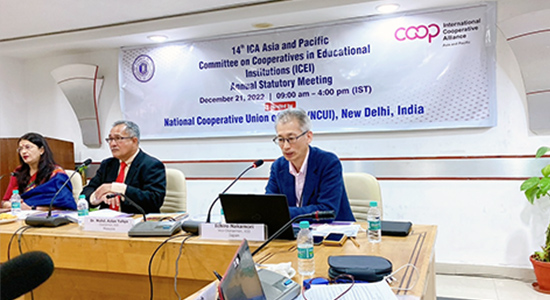
During the conference, we presented on the current state of university co-ops in Japan.
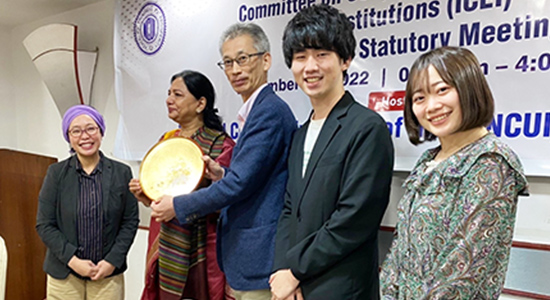
As a token of appreciation, we were given a commemorative gift.
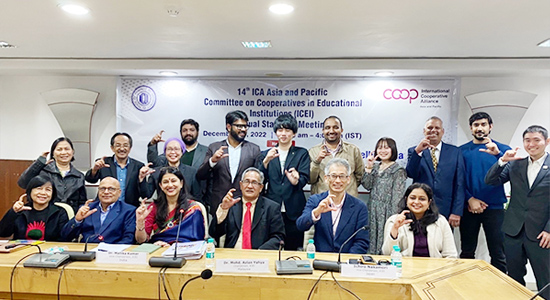
This group photo captures the participants of the ICEI Annual Conference.
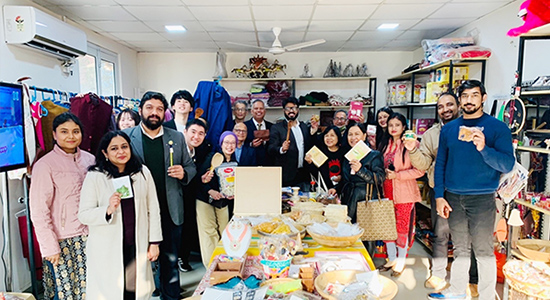
We stopped by the co-op store at NCUI and took a group photo while shopping for some items.
Seminar at Shri Ram College of Commerce (December 22)
We participated in a seminar at Shri Ram College of Commerce which discussed cooperative businesses and entrepreneurial opportunities for young people in the Asia-Pacific region. The event featured greetings from ICA Asia-Pacific Committee on Co-operatives in Educational Institutions (ICEI) and National Cooperative Union of India (NCUI) and included keynote speeches. Representatives from Japan, the Philippines, Malaysia, and Nepal reported on their cooperative projects, as well as their achievements and challenges with youth participation.
In our presentation from Japan, we shared the initiatives of the Student Committee at the university co-op, including store management, health and safety measures, and community-building activities. We also discussed the challenges and potential opportunities for university co-ops.
In India, where there is a dearth of employment opportunities despite a large population of young people, the concept of cooperative businesses is especially significant. Young people are encouraged to work collaboratively to create businesses where there is a need. The active involvement of Japanese university students in their co-ops was particularly inspiring for the Indian students who will contribute to India’s future.
During the question-and-answer session, attendees posed questions such as “How do you address the diverse needs of students?” and “What are the necessary steps to establish a co-op on a university campus?”
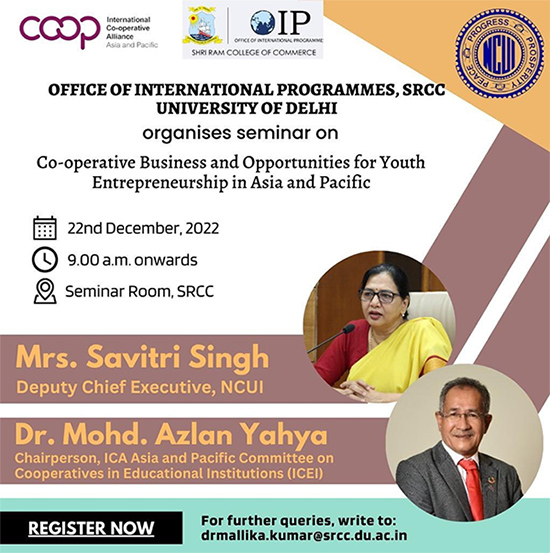
This is the poster for the event we attended.
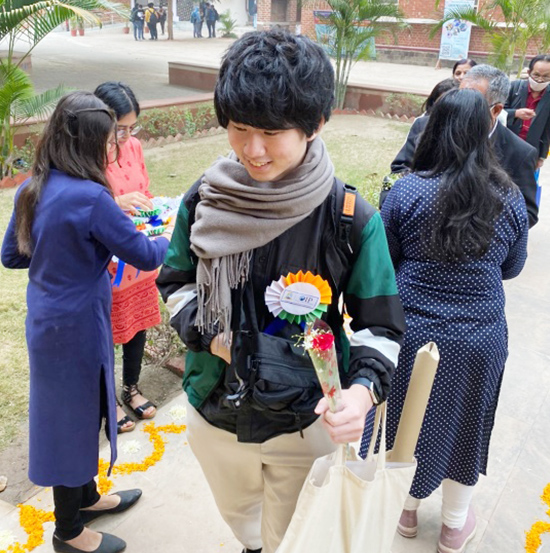
We were welcomed with flowers and Indian flag badges. We received many flowers during our visit to India.
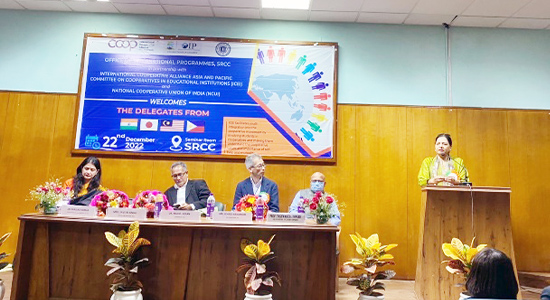
The venue set up for the seminar (1)
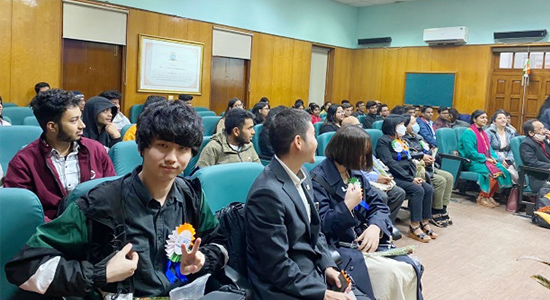
The venue set up for the seminar (2) About 50 SRCC students attended.
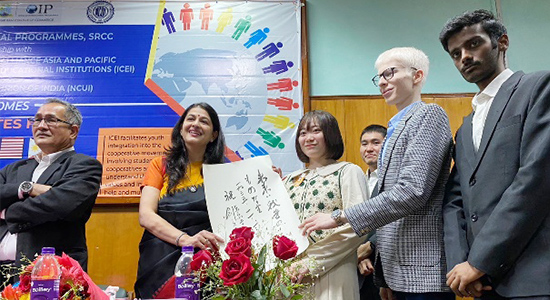
During our report, we introduced “Mirai ha warera no mono na sato” (“The future is ours”) as a phrase that Japanese university co-ops cherish.
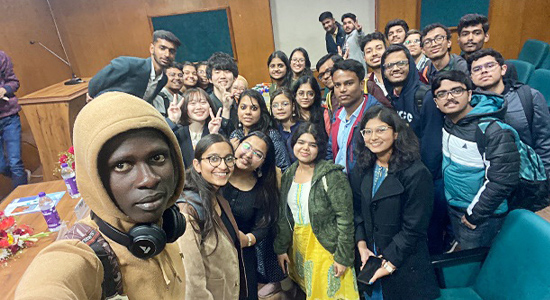
We took many pictures after the session ended!
Presentation at Chanakya University (December 23)
On December 23, we delivered a presentation about Japanese university student cooperatives at Chanakya University in Bangalore, India. Although the university was established less than a year ago and currently has only around 100 students in the first term, they are aiming to establish a university co-op and hope that these students will become members who will take the initiative in creating it.
The presentation covered the projects and activities of Japanese university co-ops, their situation during the pandemic, and their plans for the future. We also discussed the efforts of the Japanese university co-op Student Committee, including health and safety initiatives and friendship-making activities, to show that students are actively involved in co-op management.
As Chanakya University is also interested in establishing a university co-op, we presented a case study of a successful co-op establishment in Japan and highlighted the role of student involvement in the process.
Our goal was to demonstrate that, despite the cultural and environmental differences between Japan and India, a university co-op can be established through the active participation of students in its management. By participating in a university co-op, students can learn about the structure and values of a cooperative.

During the morning, we were given a tour of the new campus, still under construction.

This campus will be a lively hub for student activity.
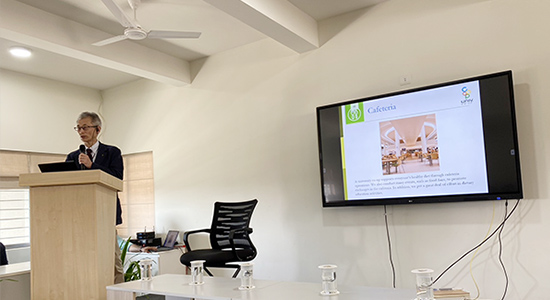
Mr. Nakamori, Managing Director & CEO of NFUCA, gave an overview presentation on Japanese university co-ops.
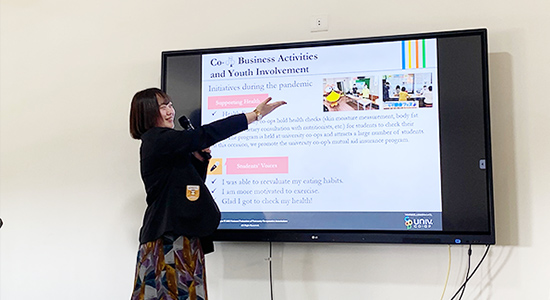
We showcased the activities of student committees from Japanese university co-ops and introduced Tanuro, the mutual aid character.
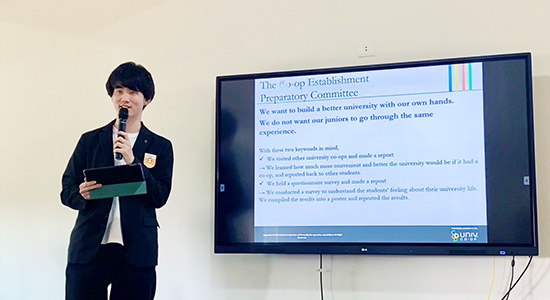
We discussed the establishment of the University Co-op.
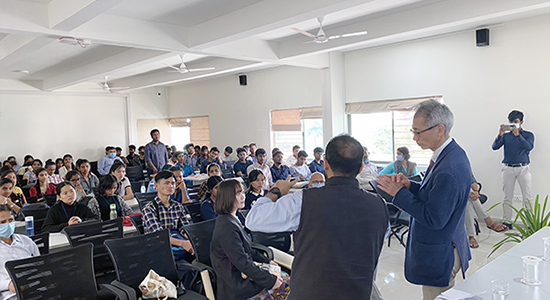
Many students were attentive during the presentation.
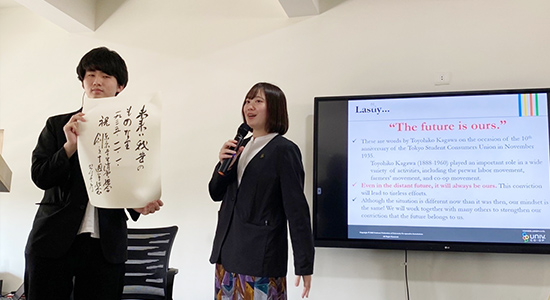
"Mirai ha warera no mono na sato" (The future is ours) was also introduced.
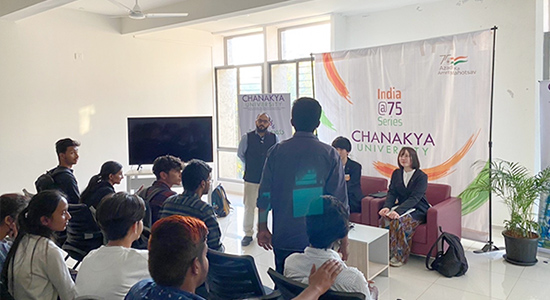
Afterward, some students stayed to ask questions and engage in an extended discussion.
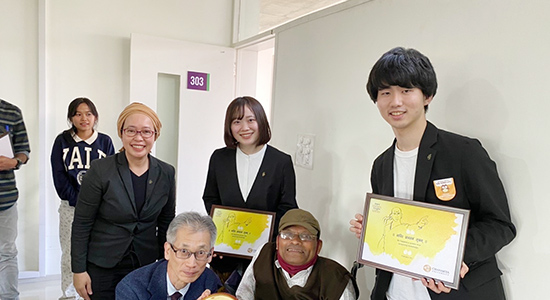
We took a photo with Prof. M.K. Sridhar, the Founder Chancellor.
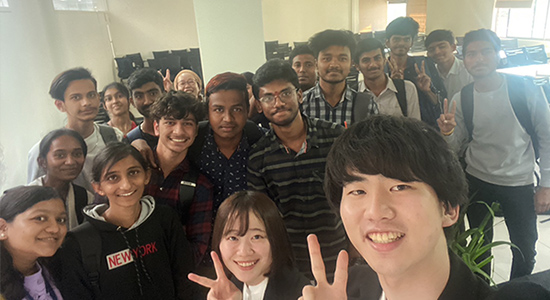
Numerous photos were taken with students.
Visit to Nitte Meenakshi Institute of Technology (December 24)
We visited the Nitte Meenakshi Institute of Technology and received an overview of the university and the Nitte University Co-op from the staff before the tour. Nitte Meenakshi Institute of Technology houses three cooperative businesses: Credit, Stationary, and Jan aushadhi (pharmacy related). Particularly, students are heavily involved in the Stationary Co-op, which has a store on campus that sells stationery and household goods. During our visit, a Nitte Meenakshi Institute of Technology student expressed their satisfaction with how the Co-op values student voices, highlighting the worldwide appeal of cooperatives.
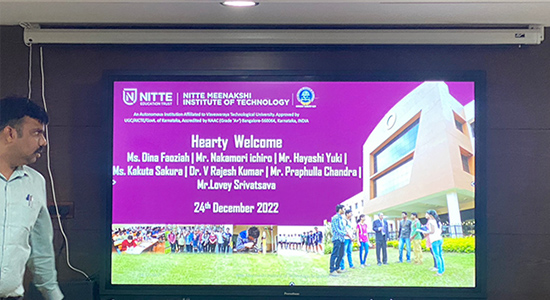
Nitte Meenakshi Institute of Technology gave a presentation about its co-op, prompting us to consider the need for English materials and videos about university co-ops in Japan that can be readily shared.
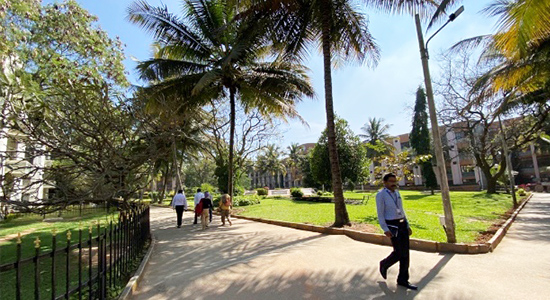
The campus of Nitte Meenakshi Institute of Technology, where many students reside in the dormitory. A first-year student expressed fondness for the campus, saying, “I have many memories here!” We wish Japanese university campuses were equally vibrant.
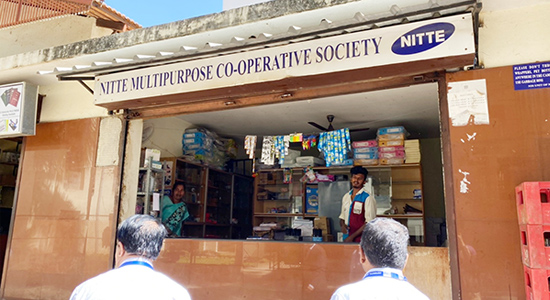
This is the university co-op, open from 9-16.
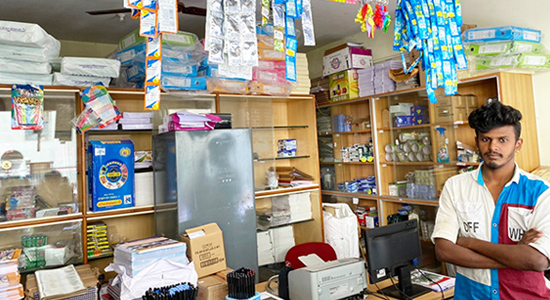
Here, students can purchase stationery and daily necessities. A dormitory resident commented, “It's very convenient because they sell detergent and other items.”
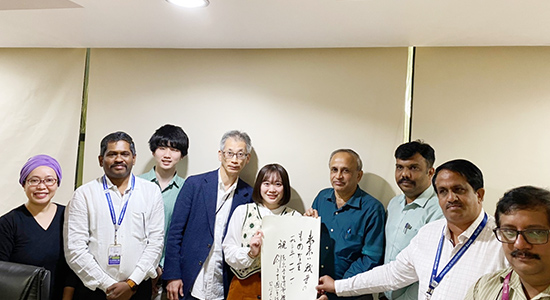
We shared the phrase “Mirai wa warera no mono no sato” (“The future is ours”), which is highly valued by Japanese university co-ops.
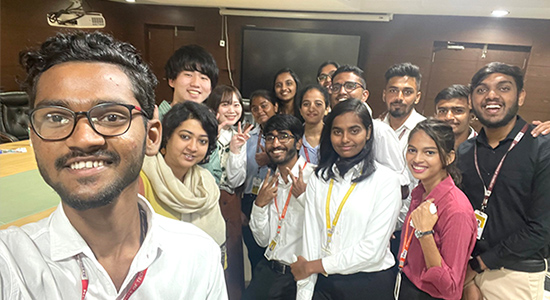
After the event, we took numerous photos!
Feedback from the NFUCA Delegation
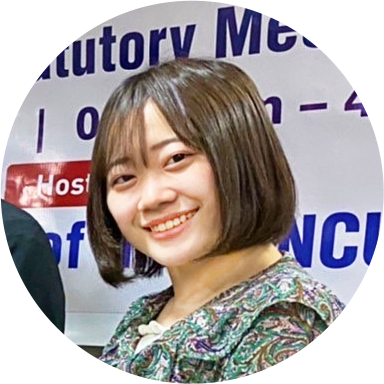
Sakura Kakuta
Chairperson, NFUCA Student Committee FY 2022
Reflections and Future Goals
The six-day business trip was a powerful experience that convinced me of the impact cooperative education can have on individuals and the country's progress. I am certain that university co-ops, with approximately half of the university students as its members, will play a pivotal role in promoting cooperatives in Japan. I am grateful for the opportunity to have joined NFUCA delegates on this meaningful trip.
The Relevance of Cooperatives in India
India faces significant national challenges, such as high youth unemployment rates and a deeply ingrained caste system. These problems necessitate cooperative thinking, where all members have equal standing. I was struck by the combination of cooperative thinking and entrepreneurship in India, as well as the generous government support. To me, this fusion embodies the essence of what I had been seeking.
I am determined to do my best in Japan!
Chapter 2 of Agenda 1 from the 66th General Meeting cites the “Vision for Human Resources of the Future” issued by the Ministry of Economy, Trade and Industry, which predicts that the abilities to identify problems, make accurate predictions, and innovate will be even more critical for work in 2030 and 2050. Thus, creating an environment that fosters problem-solving and social issue exploration, and cultivates the capacity for continuous improvement within one's community, will be essential. University co-ops, which aim to enhance their members' lives through participation and collaboration, can serve as platforms for university students to acquire and practice the skills that will be required of them in the future. The report concludes with the observation that India is actively pursuing cooperative education and experiential learning, positioning itself at the forefront of this movement.
Although there are differences in the current situations and backgrounds of India and other countries, the experience of participating and being involved in cooperatives in Japan can still be useful later in life. In Japan, university cooperatives have become commonplace and people's lives have become more prosperous than before, making it difficult to feel that one's life has improved by participating in the activities and management of university cooperatives. However, this is precisely why we must always prioritize the voices of our members (putting them at the center!) and work closely with them in all that we do. As a University Co-op, I aspire to be a place where students can learn, gain experience, and grow. I am confident that a Japanese university co-op, with its history of being built and run by its members, providing opportunities for student participation and involvement, and offering a platform for business activities, can achieve this goal!
The objective of Japanese university co-ops is to enhance the quality of life for their members and develop individuals who can proactively lead their lives after graduation. In line with this philosophy, I aspire to transform the University Co-op into a space where students can learn about cooperatives. The Co-op has the potential to positively impact the lives of individual students. Therefore, I will strive to make meaningful contributions to the University Co-op with this goal in mind.
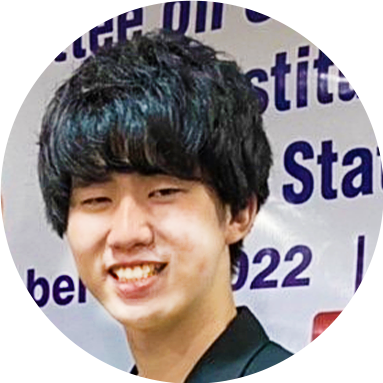
Yuki Hayashi
Vice Chairperson, NFUCA Student Committee FY 2022
Impressions
During my business trip to India, I became resolute in my commitment to co-operative activism. Attending this valuable event was an opportunity for which I am grateful. I hope that Japanese university co-ops will continue to enhance their identity through global exchanges with other cooperatives. Personally, it felt like fate that I had the chance to discuss co-op establishment, and it reinforced my desire to prioritize it as a focal point in my future endeavors.
Advantages of Japanese University Co-ops
I came to realize that Japanese university co-ops have a noteworthy history spanning over six decades. They take pride in their unique identity, which includes a system that promotes student participation in management and enables solidarity in business and activities among universities of different sizes. Moving forward, I aspire to strengthen the active involvement of our members in co-op management and encourage mutual support and collaboration.
Comparatively, the circumstances for students in India differ significantly from those in Japan. A lower percentage of students attend university, and most students live with their families without part-time jobs. In contrast, Japanese university co-ops are organizations deeply embedded in universities and communities that can provide crucial support to students. I hope to continue pursuing this ideal.
On Cooperatives
Previously, I regarded cooperatives as organizations that strive to achieve a common goal with the collective efforts of members, contrasting them with the corporate structure of joint-stock companies. However, my recent discovery of the Indian approach surprised me. They employ cooperative values, mechanisms, and principles to create entrepreneurial opportunities.
As an educational institution that prepares students for society and a small community where students can cultivate success by contributing to the creation and management of their university life, it is essential to recognize the significance of co-operatives based on the principles, mechanisms, and origins of cooperatives. As a member of the cooperative, I value the importance of fostering this idea and collaborating with fellow student members to achieve it.

Ichiro Nakamori
Managing Director & CEO, NFUCA
My First Impression of India
- Upon my maiden voyage to India, I was struck by the nation’s overarching optimism. With a staggering population of roughly 1.4 billion people, India is poised to surpass China and claim the title of the world’s most populous country by 2023. The idea of utilizing cooperatives to enhance the productivity of this burgeoning population is pervasive throughout the country, particularly in the education system where young individuals are encouraged to engage in cooperative practices. In essence, entrepreneurship is the defining concept of cooperative education in India.
- During conversations with local university students, I was moved by their spirited aspirations, many of which centered on pursuing careers in IT-related start-up companies.
Japan as Seen by Indian University Students
- Japanese university students had the chance to interact with local students at SRCC, Chanakya University, and Nitte Meenakshi Institute of Technology. After Kakuta and Hayashi gave their presentations, the Indian students eagerly approached them, engaging in short conversations in English, and taking commemorative photos with their smartphones. They also exchanged social media accounts. This scene was reminiscent of Japan and reinforced the idea that university students are the same worldwide.
- Surprisingly, some students spoke to us fluently in Japanese, expressing their gratitude with the phrase “Arigatou gozaimashita!” (‘Thank you’ in Japanese) " When I inquired about their language skills and asked where they learned Japanese, they responded that they watched Japanese anime! I was taken aback and impressed by their proficiency, and felt that anime was a cultural treasure that Japan could be proud of.
Work that Values Human Beings
- The promotion of cooperative education is actively underway in India and Malaysia, supported by their respective governments, with a focus on entrepreneurship. Japan is lagging behind in this aspect.
- Cooperatives are based on the values of self-help, self-responsibility, democracy, equality, equity, and solidarity. In the tradition of their founders, cooperative members believe in the ethical values of honesty, openness, social responsibility and caring for others (as stated in the ICA Statement on the Cooperative Identity).
It is impressive to see high school and university students in India and other Asian countries learn about these principles through cooperative education. I am pleased to note that the audience responded positively to the value of member participation emphasized by Japanese university co-ops during the presentations by Kakuta and Hayashi. - This business trip was exciting as I reflected on the potential for expanding work that values human beings, thanks to the interactions we had with the young people.
* Interesting fact: We brought back many souvenirs from Japan, but the Tanuro Emblem was a particular hit with the university students! If you come across a Tanuro Emblem in India in the future, it might be something we brought there!
